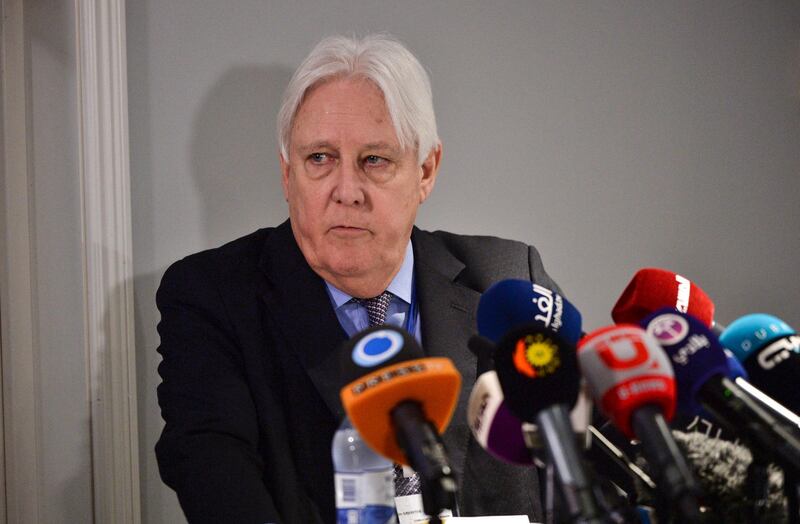For the first time in many months, there is a sense of cautious optimism about Yemen. The UN Special Envoy of the Secretary-General for Yemen, Martin Griffiths, has succeeded in bringing various sides to the table to negotiate a political solution to the conflict that has gripped the country since Houthi rebels overthrew the legitimate government of President Abdrabu Mansur Hadi in Sanaa in 2014.
This week’s negotiations have given a glimmer of hope after years of pain and suffering for the nation’s people. While talks in themselves are not an end, they are a vital means to lay out a roadmap to end the war and political upheaval that has led to a humanitarian crisis.
Mr Griffiths has highlighted three elements for the current stage of talks: confidence-building measures, finding ways of reducing the violence and setting a framework for the negotiations.
The two parties are engaged in a serious and constructive way in discussing the details of confidence building measures, the reduction of violence, and the framework for negotiations. We hope we will achieve progress during this round of consultations #Yemen
— @OSE_Yemen (@OSE_Yemen) December 8, 2018
While these are important steps towards a negotiated settlement, the cautious optimism about Yemen rests in the fact that the sides have finally come to the table. The last effort, three months ago, failed when the Houthis refused to even engage in talks. Having the negotiators in a remote town, at the height of Sweden’s freezing winter, has meant that they are forced to knuckle down and get to work on a negotiated settlement.
The first moves, including measures such as prisoner swaps, are vital to creating a momentum that can help end the war and bring back a legitimate government to the seat of power in Sanaa. While the road is littered with obstacles, including those thrown in by actors who benefit from a war economy and lack of strong governance, the journey towards a settlement looks possible.
This week, a number of officials and researchers gathered in Abu Dhabi, at an event organised by the Arab Gulf States Institute in Washington under the title "Yemen After the War: addressing the challenges of peace and reconstruction". It may seem premature to be discussing "Yemen after the war", but any chance for peace will need to be based in the stabilisation efforts that appear to be starting to take place now.
A gradual approach is needed in Yemen, starting in areas where there are opportunities to help improve people’s lives, which will act as a catalyst for wider peace. In areas free of Houthi rule, such as Aden, reconstruction projects have already begun to positively impact people’s lives.
The US Assistant Secretary for the Bureau of Conflict and Stabilisation Operations, Denise Natali, stressed the importance of such efforts "in areas that are ready". Stabilisation here means a narrow focus on immediate attempts to improve lives, in order to create a political opportunity to reduce violence. This goes beyond crucial humanitarian support and relies on rebuilding societies emerging from conflict.
It will also entail building the capacity of local government to deliver services and not become overly reliant on long-term external aid. The chairman of Yemen’s Justice and Building Party Mohammed Abulahoum stressed the urgent need to “improve people’s lives” in order to build on the moment created by the Sweden talks. This is an opportunity that could up being all too fleeting, and such an approach is the surest way to “rebuild trust and hope” – two things the people of Yemen are in dire need of.
The coming weeks will present challenges for Yemen and particularly the representatives of President Hadi’s government. They will have to contend with attempts to usurp international agreements on their legitimate role in Yemen, while negotiating with militias. Knowing how much to compromise and when is vital in complicated negotiations, but compromise will be necessary to stop the bloodshed.
On the other hand, the Houthis and their supporters will try to get as much as they can, knowing that today they have more power and leverage, gained by violence, than they would in a representative political process.
A fragile political route towards peace will need to be supported by rebuilding projects, reconstructing the social fabric and the goodwill of the international community. As Mr Abulahoum has said, “Yemen’s future is with Saudi Arabia and the UAE”, and its immediate neighbours. Their security and interests are interdependent and their pledges for reconstruction efforts will be critical to Yemen’s future.
However, the wider international community will also have to be invested in stabilising and supporting Yemen, while preventing those who act as spoilers from taking away a rare chance at peace. An architecture of reconstruction will have to be agreed upon that can resuscitate Yemen, in both its public and private sectors, with the important task of creating jobs and livelihoods. But before getting to “the day after”, the world must invest all its efforts supporting the current UN-led process and protecting it. We cannot afford another failed “process” in the Arab world.





